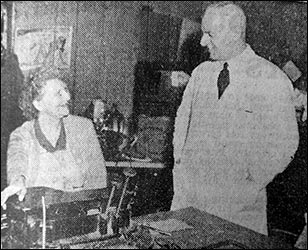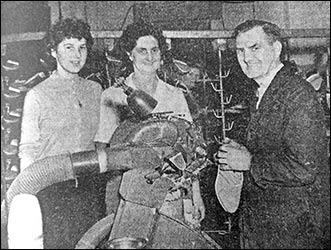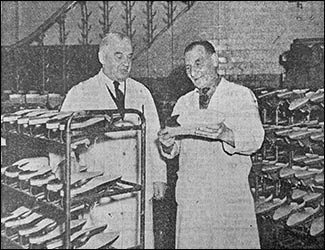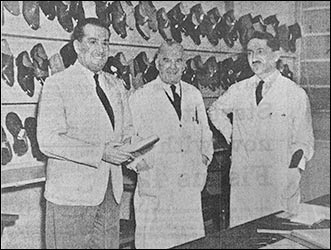|
The Rushden Echo and Argus, 5th February 1960
Allebone’s grew from strike which brought 1895 upheaval
ONE of the old family businesses which have made Rushden a stronghold of the footwear industry owes its origin to a strike. It was the big upheaval of 1895 that unsettled two men and set up the business now known as Allebone and Sons, Ltd.
First figure in the story is Augustus Allebone, born at Wellingborough and presently earning his living by closing boot uppers—at his home—for the well-known firm of Brown.
In 1888 he was at Rushden, living in a Queen Street cottage and working as a shoe finisher in a back "shop" attached to it. The boots he finished—spring-side Chelseas, kid leg button boots—were taken out from Ebenezer Claridge's factory in Rectory Road.
New path of life
The 1895 strike was protracted, and the boot workers lost a lot of time and money. Mr. Allebone and his friend, James Hyde, talked it over and decided to try a new path in life. Obtaining premises—part of William Colson's property— in Duck Street, they set up as Allebone and Hyde, general boot manufacturers. In 1898 they built a factory (now part of Walter Sargent and Co's) in Glassbrook Road. The partnership was dissolved in 1902, and Mr. Allebone took over the Wellingborough Road factory now occupied by the Adult School, also occupying the old premises just round the corner in Duck Street. The output then was a few hundred pairs a week of strong, serviceable boots.
 |
 |
|
At the Selwood factory: director F G Deane talks
with Mrs C Page, an employee for than forty years.
|
Another family affair: Mrs Maud Tomlin, the closing room forewoman, with her daughter Glenys (office staff) and her brother, Mr Reg Wiggins (finishing department)
|
Arthur, the founder's younger son, became foreman of the making room at the age of 15, and took on more general duties as the business moved, in 1907, to a High Street factory vacated by Sanders and Sanders and, in 1914, to the present site in Oakley Road.
Boots for the Army
The founder continued actively in the business until 1914 and died in 1928. His elder son, Horace, was killed in action during the First World War—a period in which the firm—which had become a limited liability company in 1913—devoted nearly all its output to the, British Army and its allies, among them the Italians and the Russians.
There have been about five enlargements of the Oakley Road factory, the most-recent one taking the delivery end of the premises into Washbrook Road.
Just over five years ago the firm's expansion took a new form when the business of George Selwood and Co. in Harborough Road was acquired.
Mr Arthur Allebone is Chairman and managing, director of the group. Two of his sons, Mr. A. A. (Gus) Allebone who joined the business direct from school in 1930, and Mr Alan Allebone, who joined in 1932 are directors, with Mr. Frank Deane from Selwoods.
 |
 |
|
Two examples of long service: Mr Arthur Allebone, who joined his father’s business as a boy, and Mr George Wilby, now foreman finisher, who started with Allebone’s at the age of 12½—over fifty years ago.
|
Father and sons: Mr Arthur Allebone (chairman/managing director)
with Mr Alan Allebone (left) and
Mr Gus Allebone (right)
|
Christian names
And those initials A’s have been the subject of some speculation, but the truth is that the family has no special preference for them. Mr. Gus Allebone acquired his Christian names from his two grandfathers, and there was no thought of the Alphabet when Mr. Arthur Allebone registered the birth of his second son.
Note also that next in the line, of shoe-making Allebones is 18-year-old Mark, the son of Alan. Now a technical student at Northampton, he assists in the business during vacations.
Phllip, youngest son of the chairman, is a doctor at Burton-on-Trent.
There has been a steady change in the firm's products since 1918, and today's range comprises high-class sports and fashion footwear for men, together with some ladies' walking and sports shoes.
The men's range has been described as one of the widest of its kind in the country and is a far cry from the old Duck Street output of youths' boots made of "split'' to sell wholesale at 3s. 1d. and retail at 3s. 11½d. No moulded work is undertaken.
The firm exports extensively to America, Canada and other countries. Some of its oldest employees—men near the 65 mark—have never worked anywhere else. Among the women are some who have been with the firm 30 years or more.
Public service
To this account of the business could be added a long story of public service given by the chairman and his sons. There has been an Allebone on Rushden Urban Council since 1925. Mr. Arthur Allebone, who joined in that year, was chairman in 1936 and relinquished his seat in 1946, to be succeeded at once by Mr. Otis Allebone, who was chairman in 1953 and retired in 1955, on moving his home to Stanwick.
Mr. Alan Allebone is of course, the present family representative.
The head of the business has been vice-chairman of Northamptonshire County Council since 1953, an alderman since 1944 and a member for 33 years, having also long experience as a magistrate.
Gus is leader of the Wellingborough Division Conservatives and both he and Alan—now a Deputy Lieutenant of the county—did strenuous service as military officers during the late war, added to which they have served the Territorial movement with distinction.
|